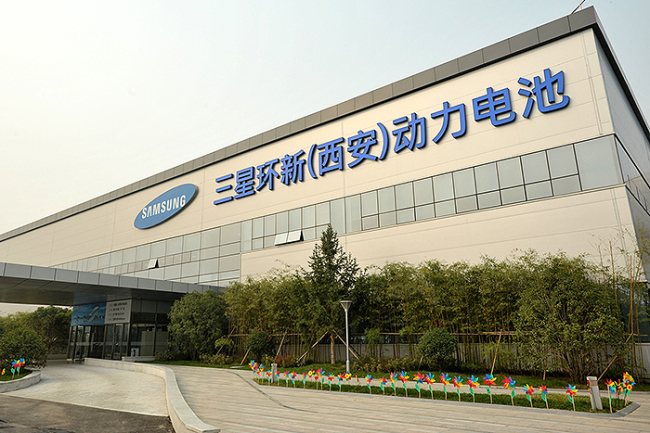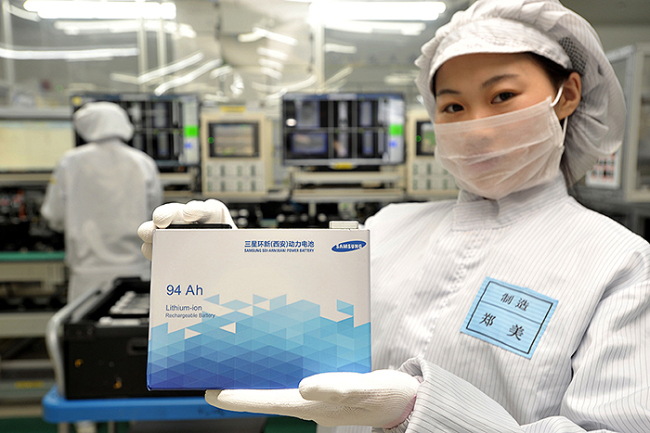[단독] 삼성SDI, 사드영향 중국 시안공장 증설 재검토
▶삼성SDI, 중국 공장 생산 배터리 공급문제로 골머리
By 김영원Published : March 20, 2017 - 18:14
[코리아헤럴드(인베스터=김영원 기자)] 한국 정부의 고고도 미사일 방어 시스템(사드• THAAD)의 한반도 배치 문제와 관련해 중국 정부의 한국 기업에 대한 압박이 지속되고 있는 가운데, 최근 삼성SDI가 중국 시안에 있는 전기차 배터리 공장 증설 계획을 일시적으로 중단하기로 했다.
"중국 내 삼성SDI의 전기차 배터리 공장이 거의 올 스톱 중”이라고 밝힌 업계에 정통한 한 관계자는 “시안 공장의 라인 증설 계획도 현재는 불투명한 상태”라고 말했다.
삼성SDI는 2020년까지 총 6억 달러(약 6910억 원)을 단계적으로 투자하겠다는 계획을 밝힌적이 있으며, 중국 시안 공장의 배터리 생산량을 2GWh에서 4GWh로 늘릴 예정이었다.

하지만 최근 중국 정부의 자국 전기차 배터리 업체 지원을 위한 규제 강화와, 한국 정부의 사드 배치 논란으로 인해 삼성SDI는 투자 계획을 재검토하고 있으며, 증설 계획이 언제 다시 시작될지는 미지수인 상태이다.
삼성SDI의 이러한 결정은 중국 시안 공장에서 생산한 배터리 처리 문제로 어려움을 겪으면서 나온 것으로 관측되고 있다.
지난 2월 삼성SDI는 미국 캘리포니아 지역 세계 최대 규모의 ESS용 배터리를 공급했다는 소식을 알렸다. 미국의 AES에너지 스토리지(AES Energy Storage)가 진행하는 전력 공급망 구축 프로젝트에 참여했으며, 삼성SDI는 약 40만 개(약 240MWh)의 리튬이온배터리를 공급했다고 한다. 이는 미국의 4만 가구가 4시간 동안 사용 가능 한 양이다.
인베스터 취재 결과 이 40만 개의 리튬이온배터리는 지난해부터 중국 시안 및 현지 공장에서 전기차 배터리 용으로 생산된 배터리로 그동안 중국 정부의 보조금 규제에 막혀 중국 전기차 업체에 공급하지 못하고 있던 제품으로 밝혀졌다.
익명을 요구한 업계 관계자는 “삼성SDI가 작년부터 중국에서 생산한 배터리 공급 이슈 때문에 어려움을 겪고 있다,”라고 밝히며, “최근 캘리포니아 향 ESS용 배터리 수주는 원활한 배터리 공급을 위한 과정의 일환”이라고 말했다.

삼성SDI는 2015년 9월 중국 시안에 전기 차용 리튬이온배터리 공장을 준공한 이후, 배터리 생산에 박차를 가하며 중국 전기차 시장 진입을 노리고 있었다. 하지만 중국 정부가 자국 배터리 생산 업체의 성장을 돕기 위해 보조금 규제를 강화하며, 삼성SDI를 비롯한 LG화학과 같은 한국 전기차 배터리 생산업체의 중국 시장 진출이 막혀버린 상태이다. 반면, 가격 경쟁력을 앞세운 BYD와 같은 중국 배터리 기업이 중국 정부의 도움을 받아 급성장하고 있는 상태이다.
현재 중국 내 SDI 공장에 남은 재고 물품에 대해서 SDI가 AES에게 추가 공급을 타진했지만 계획이 없다고 해서 무산되었고, 현재는 유럽이나 제3국 공급을 위해 알아보는 상태라고 한다.
삼성SDI는 중국 내 전기자동차 배터리 사업의 어려움에 더해, 작년 불량 배터리로 발생한 갤럭시 노트7 사태로 인해 큰 타격을 받으면서, 올해 초 2014년부터 SDI를 이끌던 조남성 대표이사가 교체되기도 했다.
삼성SDI는 현재 중국의 톈진, 시안, 우시, 쑤저우, 허베이 등에 공장을 운영 중이며, 전기차 배터리는 시안에서만 생산하고 있다.
Samsung SDI suspends expansion plans for Chinese battery plant
[THE INVESTOR] Samsung SDI has suspended its plans to add new production lines at its battery plant in Xian, China, amid the local government’s escalating economic retaliation against South Korea’s deployment of the US-made THAAD missile system, industry sources said on March 20.
“As its production lines in China have been almost idle for months, the company recently decided to reconsider the planned expansion of the Chinese plant,” an industry source told The Investor on condition of anonymity.
The nation’s largest battery maker had planned to spend US$600 million to install additional battery manufacturing lines at its Xian plant by 2020.
The latest decision comes amid the rise in its battery inventories in China as the battery maker has been exempted from the government’s subsidies for electric vehicle makers and their suppliers from this year.
Without the government’s generous cash benefits, the cars powered by Samsung SDI batteries would lose price competitiveness over their cheaper rivals mostly using China-made batteries.
Since its Xian battery manufacturing complex started operations in September 2015, the company has not inked any major supply deal in the world’s largest EV market.
In order to cut inventories in China, the battery maker is said to be tapping other markets such as Europe and North America to offset the losses.
“Samsung SDI could reduce some inventories by supplying batteries to a California energy storage project recently,” the source added, referring to the firm’s supply of 240 megawatt-hours of lithium-ion batteries to AES Energy Storage, a US power solutions firm, in February.
“Because no more batteries are needed for the California project, the company is now exploring Europe and other markets.”
Sources predict the talks with European partners would be tricky too considering governments around the world prefer to offer subsidies to companies operating local production lines.
Samsung SDI recently decided to build a new EV battery plant in Hungary with aims to start production from 2018.
Sluggish battery sales in China, coupled with the Samsung Galaxy Note 7 fiasco last year, have also triggered the sudden departure of the company’s former CEO Cho Nam-sung last month. He was the only one who resigned from the post among some 60 CEOs across Samsung affiliates.
Jung Young-hyun, former chief of Samsung Electronics’ memory chip business unit, was named to replace Cho on Feb. 28.
Sources say Samsung SDI’s reeling battery business could face further challenges in China due to the tense Sino-Korea relations.
By Kim Young-won (wone0102@heraldcorp.com)



![[Herald Interview] 'Amid aging population, Korea to invite more young professionals from overseas'](http://res.heraldm.com/phpwas/restmb_idxmake.php?idx=644&simg=/content/image/2024/04/24/20240424050844_0.jpg&u=20240424200058)












![[KH Explains] Korean shipbuilding stocks rally: Real growth or bubble?](http://res.heraldm.com/phpwas/restmb_idxmake.php?idx=652&simg=/content/image/2024/04/25/20240425050656_0.jpg&u=)

